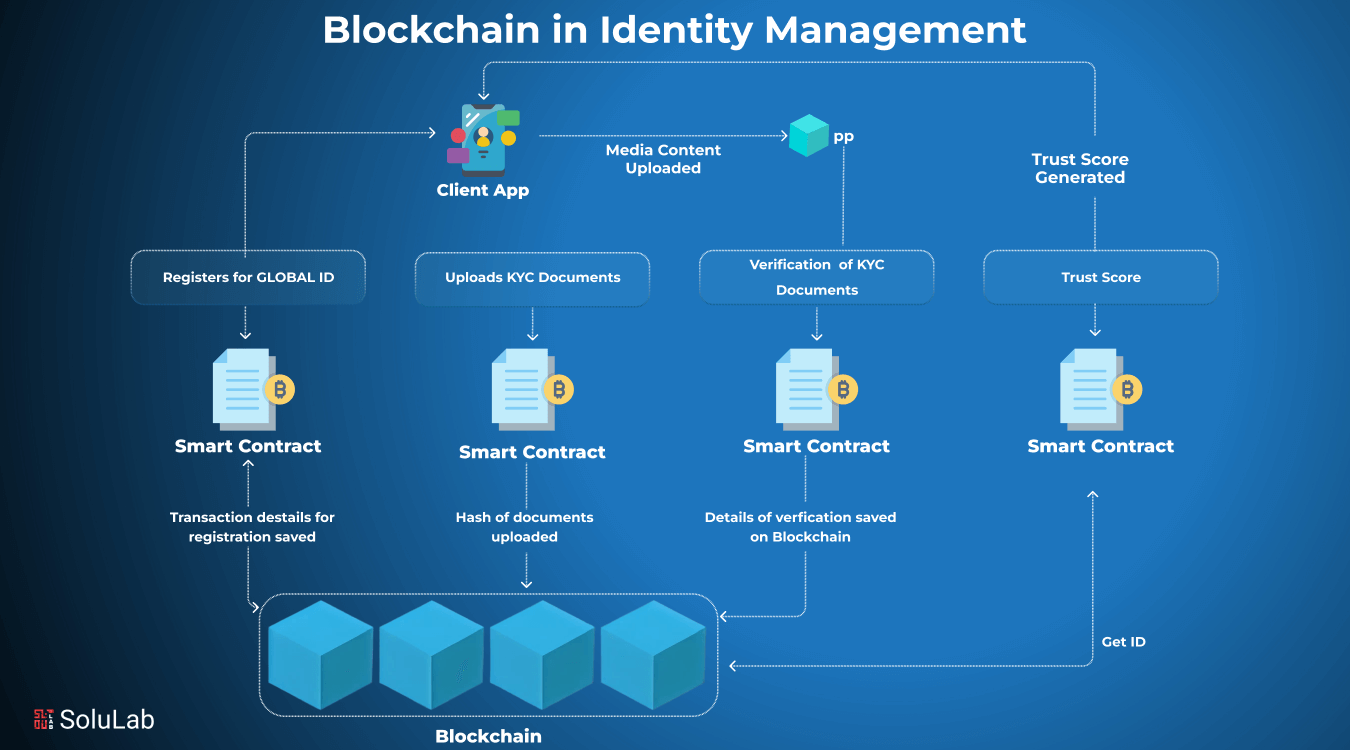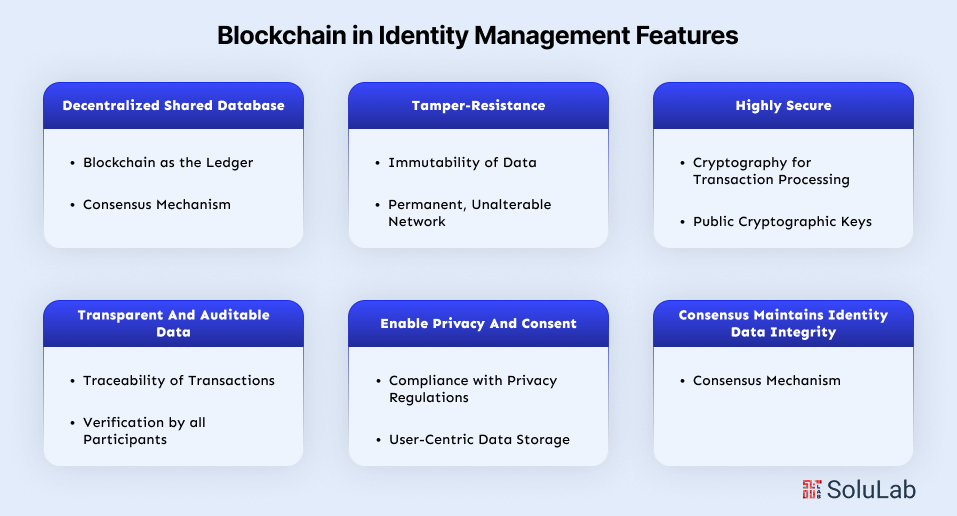
Blockchain in identity management offers a decentralized, secure way to control personal data, solving risks linked to centralized databases. Traditional systems rely on government IDs stored in vulnerable servers, leading to frequent breaches.
Leading blockchain development companies are building self-sovereign identity (SSI) platforms that empower users with secure ownership of their blockchain identity. Global spending on digital identity services is projected to hit $3.58 billion by 2026, driven by innovations like Layer 1 Blockchains and AI agents automating verification and fraud detection.
This blog explores challenges of legacy ID systems, how blockchain-based identity verification systems fix them, and future trends, especially in the UAE, where blockchain-based biometric identity management is gaining momentum.
Traditional Challenges in Identity Management
According to the 2024 IBM Cost of a Data Breach Report, the average global breach cost has surged to $4.45 million, underlining the vulnerability of centralized systems. Blockchain technology offers a decentralized alternative that reduces these risks by shifting identity control away from vulnerable central servers.
Today’s identity systems face four major challenges:
1. Identity Theft
With users sharing personal data across numerous platforms, identity theft is rampant. Centralized storage makes these platforms a target, over 4.8 million records are compromised daily, according to the Breach Level Index. These alarming numbers fuel demand for blockchain use cases in secure digital identity.
2. Combination of Usernames and Passwords
The average user manages around 100 online accounts, increasing exposure to phishing and password fatigue. Traditional systems are ill-equipped for this scale. Decentralized Identifiers (DIDs) and verifiable credentials eliminate the need for passwords, an innovation led by many Blockchain development companies.
3. KYC Onboarding Costs and Inefficiencies
Traditional KYC involves multiple intermediaries, making onboarding slow and expensive. A 2023 Thomson Reuters survey found that financial firms spend over $48 million annually on KYC, with onboarding often taking 3–5 days. Blockchain-as-a-Service streamlines this with automated, secure onboarding systems powered by AI agents and smart contracts.
4. Lack of User Control over Personal Data
Users often lack visibility and control over how their Personally Identifiable Information (PII) is shared. This creates compliance risks under GDPR and CCPA. By enabling self-sovereign identity (SSI), blockchain technology returns data ownership to users. It’s an approach embraced by top blockchain development companies building solutions that align with responsible AI and automated compliance via AI agents for Enterprises.
How Blockchain Works in Identity Management?
Blockchain technology is reshaping the future of digital identity services, solving long-standing issues in traditional systems by enhancing security, transparency, and user control.
1. Decentralized Identity Systems
Unlike centralized databases vulnerable to breaches, blockchain in identity management distributes data across a network of nodes, removing single points of failure. This empowers users with full control over their information. Blockchain-based identity management in the UAE is rapidly adopting this decentralized model through Blockchain-as-a-Service, enabling secure, user-owned identity ecosystems.
2. Immutable and Tamper-Proof Records
Data stored on a blockchain is immutable; it cannot be altered or erased. Each change is recorded as a new block, forming an unchangeable audit trail. This makes blockchain identity verification systems highly resistant to fraud and manipulation compared to traditional methods.
3. Smart Contracts for Instant Verification
Smart contracts automate identity verification by executing predefined rules. When someone shares their identity, the contract validates it instantly, removing the need for third-party verification.
This not only speeds up onboarding and KYC processes but also reduces errors. Leading blockchain development companies leverage smart contracts to build secure identity frameworks across industries.
4. Public and Private Key Encryption
Instead of passwords, blockchain identity platforms use cryptographic keys. Users have a public key (like a digital ID) and a private key (like a signature). When identity data is shared, it’s signed with the private key and verified by the public key, ensuring that only the rightful owner controls access, which is building a foundation for blockchain-based biometric identity management and other advanced solutions.
Key Features of a Blockchain in Identity Management

Blockchain based identity management introduces a paradigm shift in how we handle and secure personal information. Here are the key features of utilizing blockchain in identity management:
1. Decentralized, Shared Database (Distributed Ledger)
- Blockchain as the Ledger: Unlike centralized identity management systems, blockchain-based identity management operates on a decentralized, shared database or distributed ledger. Every participant in the network maintains a copy of the ledger, ensuring transparency and eliminating the need for a central authority.
- Consensus Mechanism: Transactions are added to the ledger through a consensus mechanism, requiring agreement from the majority of participants. This process enhances security and prevents unauthorized alterations to the identity data.
2. Tamper-Resistance
- Immutability of Data: Once identity information is recorded on the blockchain, it becomes tamper-resistant. The design of blockchain technology ensures that information once added to the ledger, cannot be changed, backdated, or altered by any single entity.
- Permanent, Unalterable Network: The permanence of identity data on the blockchain establishes an unalterable network, maintaining the integrity of personal information and preventing fraudulent activities.
3. Highly Secure
- Cryptography for Transaction Processing: Blockchain systems utilize cryptography, a fundamental aspect of computer science, to secure the processing and storage of transactions. This cryptographic protection ensures that personally identifiable information remains confidential and secure.
- Public Cryptographic Keys: Instead of storing sensitive information directly on the blockchain, public cryptographic keys are used. This means that verification of information can occur without exposing the actual details, adding an extra layer of security.
4. Transparent and Auditable Data
- Traceability of Transactions: Every participant in the blockchain network can trace the recorded transactions, ensuring transparency in the identity management process.
- Verification by All Participants: The distributed nature of the ledger allows everyone in the network to verify data, creating an auditable trail of information. This openness improves accountability and confidence among stakeholders.
5. Enables Privacy and Consent
- Compliance with Privacy Regulations: Blockchain-based identity management aligns with privacy regulations by providing users with control over their data. Compliance with rules that mandate explicit user consent before data sharing is a key feature.
- User-Centric Data Storage: Users store their data, reducing the risk of unauthorized access. Because blockchain is decentralized, it has no one center of control or failure.
6. Consensus Maintains Identity Data Integrity
- Consensus Mechanisms: Blockchain employs consensus mechanisms to validate transactions and govern the network. This ensures the accuracy and integrity of identity data by preventing the inclusion of inaccurate or potentially fraudulent information.
In brief, blockchain-based identity management offers a decentralized, tamper-resistant, highly secure, transparent, and privacy-focused solution. The integration of consensus mechanisms further enhances the reliability of identity data, making blockchain a transformative technology in the field of identity management.
Benefits of Blockchain in Identity Management
From the perspective of the user, employing identity management using blockchain
offers several advantages:
-
Unique Identifier
Every user registering on the blockchain identity management system receives a distinctive identity number. This unique ID encompasses all personally identifiable information encrypted and stored on the user’s device, supported by IPFS. Users can share these unique IDs with third parties, facilitating direct authentication through the blockchain identity management system.
-
Consent Control
The blockchain identity management system refrains from storing any user information directly. Utilizing smart contracts, the system enables controlled data disclosure, preventing any manipulation of data on the blockchain. This approach ensures heightened security for identity holders, as no transaction involving user information can occur without explicit user consent. Users maintain control over their personally identifiable information.
-
Decentralization for Enhanced Security
Personal identification documents are not stored on a centralized server in the blockchain identity management system. Instead, all user documents that serve as identifiers are stored on their devices, backed by IPFS. This decentralized storage strategy safeguards against large-scale data breaches. By utilizing blockchain identity management with IPFS, the system prevents hackers from stealing identifiable information. The decentralized nature ensures the absence of a single point of failure (SPOF), enhancing overall system resilience.
-
Universal Ecosystem
Blockchain identity management transcends geographical boundaries, creating a universal ecosystem. Users can seamlessly utilize the platform across borders to verify their identity. This feature emphasizes the global applicability and accessibility of the blockchain identity management system.
Blockchain Identity Management Use Cases
Blockchain-based identity management has garnered significant attention for its transformative potential across various industries. Below are several compelling blockchain identity management use cases that highlight the diverse applications of this technology:
1. Financial Services: Secure Transactions: Blockchain identity management ensures secure and transparent financial transactions. Users can establish their identity seamlessly, reducing the risk of fraud and enhancing the overall security of financial interactions.
2. Patient Data Security: Blockchain in identity management offers a robust solution for securing patient data. Medical records can be stored in a tamper-resistant and decentralized manner, allowing authorized individuals, such as healthcare providers, seamless and secure access.
3. Citizen Identity Verification: Governments can leverage blockchain identity management to enhance citizen identity verification processes. This can streamline public service delivery, and voting systems, and reduce identity-related fraud in public programs.
4. Product Authentication: Blockchain identity management ensures the authenticity of products in the supply chain. By tracking and verifying each step of a product’s journey, consumers can trust the origin and integrity of the goods they purchase.
5. Credential Verification: Academic credentials, certifications, and degrees can be securely stored and verified on the blockchain. This ensures that individuals can easily prove their educational qualifications without the need for intermediaries.
6. Digital Onboarding: Blockchain identity management simplifies digital onboarding processes for online platforms. Users can securely verify their identity, reducing the risk of identity theft and providing a seamless and trustworthy experience.
7. Automated Legal Processes: Smart contracts enabled by blockchain identity management can automate various legal processes. This includes contract execution, property transactions, and other legal agreements, reducing the need for intermediaries and enhancing efficiency.
8. AI-Driven Identity Verification: AI agents integrated with digital identity services enable real-time identity checks across sectors. In healthcare, AI agents in Healthcare validate patient data securely. For corporations, AI agents for Enterprises automate onboarding and detect fraud, ensuring trust and compliance. For example, tools like SEON’s reverse phone lookup help verify phone numbers during onboarding, adding an extra layer of fraud detection and enhancing the reliability of identity verification systems.
9. Enterprise Access & Zero Trust Security: Enterprises are shifting to zero-trust security powered by Blockchain-as-a-Service. With AI agents for Enterprises, access is managed dynamically across locations and devices. Leading Blockchain development companies offer scalable solutions for secure enterprise identity.
10. Identity Wallets & Self-Sovereign IDs: Decentralized identity wallets like the EU EUDI Wallet and the UAE’s digital ID let users control their data. Blockchain for identity management and blockchain identity management UAE empower citizens to verify identities privately using digital identity services.
These use cases exemplify the versatility and adaptability of blockchain identity management across different sectors, showcasing its potential to enhance security, streamline processes, and create more trustworthy ecosystems. As the technology continues to mature, we can anticipate even more innovative applications in the realm of identity management.
Future Trends in Blockchain Identity Management
As blockchain in identity management continues to grow, we’re seeing new trends shape the way individuals and organizations secure and control their digital identity services. The focus is shifting toward privacy-first, decentralized solutions that put users in charge, powered by advanced blockchain identity technologies.
1. Decentralized Identity Solutions
Decentralized identity gives people full control over their personal information. Instead of relying on governments or big tech, identities are created and verified directly on the blockchain, making them tamper-proof and secure. These solutions are gaining momentum globally, especially in regions like the Blockchain in UAE ecosystem, where trust, compliance, and data ownership are top priorities.
2. Interoperability and Standardization
As more blockchain-based identity verification systems emerge, the need for universal standards is growing. The future of blockchain and digital identity lies in making systems work together. Seamless data sharing across platforms and networks will be key for worldwide adoption and for delivering frictionless user experiences across industries.
3. Self-Sovereign Identity (SSI)
Self-sovereign identity means users decide what information they share, and with whom. This model removes third-party intermediaries and protects privacy by using blockchain’s immutable ledger. SSI is also foundational to blockchain-based biometric identity management, enabling safe and simple access to digital services without compromising user control.
4. Biometrics and Multifactor Authentication
Adding biometrics like fingerprints or facial recognition strengthens blockchain identity systems. When combined with multifactor authentication and cryptographic keys, it creates powerful protection against identity theft. This approach is gaining interest from enterprises using blockchain and digital identity to improve security and compliance.
5. Enhanced Privacy Features
Technologies like zero-knowledge proofs allow users to prove who they are without sharing unnecessary details. This balances the transparency of blockchain with the need for privacy, critical for meeting regulations like GDPR. These privacy-driven innovations are fueling growth in blockchain identity management UAE, helping users and businesses stay compliant while maintaining trust.
Final Words
Blockchain in identity management is changing how we protect and control our personal data. With tools like blockchain-based identity verification systems and digital identity services, users now have more security and control than ever before.
Adoption is growing fast, especially in places like the UAE, where blockchain-based biometric identity management is gaining traction. This shift toward blockchain and digital identity offers real benefits for both users and businesses.
At SoluLab, a leading blockchain development company, we help companies build secure, easy-to-use blockchain identity solutions. Whether you’re in the UAE or anywhere else, our team can guide you in using blockchain to simplify and protect identity management.
Want to learn more? Let’s talk about how we can upgrade your identity system with blockchain.
FAQs
1. How does blockchain improve identity security?
Blockchain in identity management improves security by removing single points of failure. Instead of storing identity data in one central system, blockchain distributes it across multiple nodes. This makes it nearly impossible for hackers to tamper with records. Encryption and smart contracts ensure only authorized parties can access personal data.
2. What is self-sovereign identity, and why does it matter?
Self-sovereign identity (SSI) gives people control over their own digital identity. With blockchain-based identity verification systems, users decide what data to share, and with whom. This reduces the risk of identity theft and supports data privacy, especially useful in countries like the UAE where digital identity is on the rise.
3. How does blockchain handle cross-border ID verification?
Blockchain and digital identity systems enable real-time, borderless verification. Since all identity data is stored securely on-chain, organizations worldwide can validate credentials without repeated checks. This is especially relevant for digital identity services in global trade and compliance-heavy sectors like finance and healthcare.
4. What’s SoluLab’s role in blockchain identity solutions?
SoluLab specializes in blockchain in identity management, offering tailored solutions like blockchain-based biometric identity management and cross-chain integrations. Whether you’re an enterprise in the UAE or a global firm, our team helps implement secure, scalable, and compliant digital identity frameworks.
5. How can businesses benefit from SoluLab’s identity solutions?
Businesses and individuals can enhance privacy, reduce fraud, and streamline KYC using SoluLab’s blockchain identity management services. We bring deep experience in Blockchain in the UAE, helping enterprises adopt Layer 1 Blockchains, smart contracts, and AI-powered compliance tools to future-proof their digital identity services.






